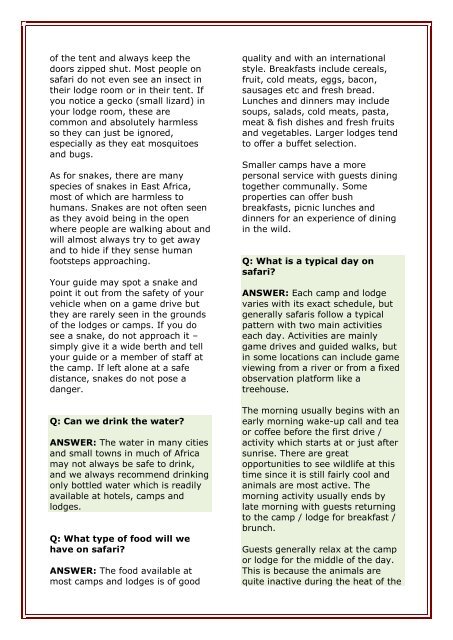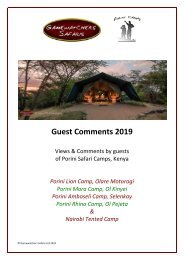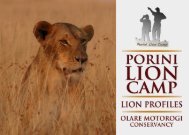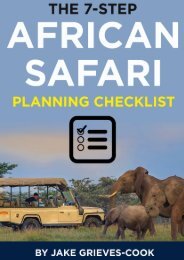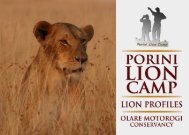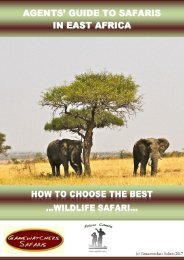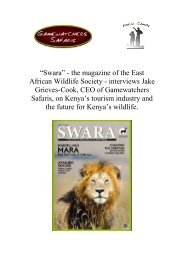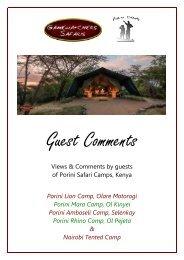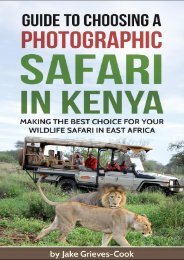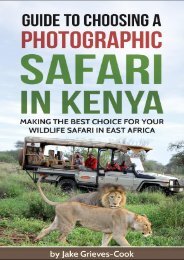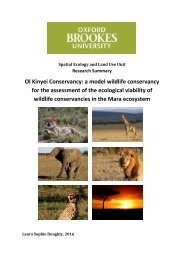How To Make The Best Choice For Your African Safari
A Guide to Choosing the Best African Wildlife Safari - where to go, what type of accommodation and transport to consider and how much it will cost.
A Guide to Choosing the Best African Wildlife Safari - where to go, what type of accommodation and transport to consider and how much it will cost.
You also want an ePaper? Increase the reach of your titles
YUMPU automatically turns print PDFs into web optimized ePapers that Google loves.
of the tent and always keep the<br />
doors zipped shut. Most people on<br />
safari do not even see an insect in<br />
their lodge room or in their tent. If<br />
you notice a gecko (small lizard) in<br />
your lodge room, these are<br />
common and absolutely harmless<br />
so they can just be ignored,<br />
especially as they eat mosquitoes<br />
and bugs.<br />
As for snakes, there are many<br />
species of snakes in East Africa,<br />
most of which are harmless to<br />
humans. Snakes are not often seen<br />
as they avoid being in the open<br />
where people are walking about and<br />
will almost always try to get away<br />
and to hide if they sense human<br />
footsteps approaching.<br />
<strong>Your</strong> guide may spot a snake and<br />
point it out from the safety of your<br />
vehicle when on a game drive but<br />
they are rarely seen in the grounds<br />
of the lodges or camps. If you do<br />
see a snake, do not approach it –<br />
simply give it a wide berth and tell<br />
your guide or a member of staff at<br />
the camp. If left alone at a safe<br />
distance, snakes do not pose a<br />
danger.<br />
Q: Can we drink the water?<br />
ANSWER: <strong>The</strong> water in many cities<br />
and small towns in much of Africa<br />
may not always be safe to drink,<br />
and we always recommend drinking<br />
only bottled water which is readily<br />
available at hotels, camps and<br />
lodges.<br />
Q: What type of food will we<br />
have on safari?<br />
ANSWER: <strong>The</strong> food available at<br />
most camps and lodges is of good<br />
quality and with an international<br />
style. Breakfasts include cereals,<br />
fruit, cold meats, eggs, bacon,<br />
sausages etc and fresh bread.<br />
Lunches and dinners may include<br />
soups, salads, cold meats, pasta,<br />
meat & fish dishes and fresh fruits<br />
and vegetables. Larger lodges tend<br />
to offer a buffet selection.<br />
Smaller camps have a more<br />
personal service with guests dining<br />
together communally. Some<br />
properties can offer bush<br />
breakfasts, picnic lunches and<br />
dinners for an experience of dining<br />
in the wild.<br />
Q: What is a typical day on<br />
safari?<br />
ANSWER: Each camp and lodge<br />
varies with its exact schedule, but<br />
generally safaris follow a typical<br />
pattern with two main activities<br />
each day. Activities are mainly<br />
game drives and guided walks, but<br />
in some locations can include game<br />
viewing from a river or from a fixed<br />
observation platform like a<br />
treehouse.<br />
<strong>The</strong> morning usually begins with an<br />
early morning wake-up call and tea<br />
or coffee before the first drive /<br />
activity which starts at or just after<br />
sunrise. <strong>The</strong>re are great<br />
opportunities to see wildlife at this<br />
time since it is still fairly cool and<br />
animals are most active. <strong>The</strong><br />
morning activity usually ends by<br />
late morning with guests returning<br />
to the camp / lodge for breakfast /<br />
brunch.<br />
Guests generally relax at the camp<br />
or lodge for the middle of the day.<br />
This is because the animals are<br />
quite inactive during the heat of the


